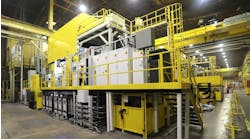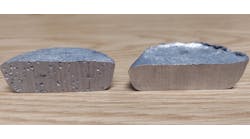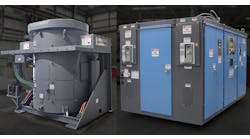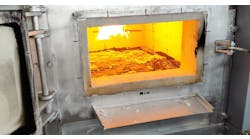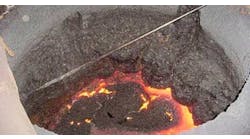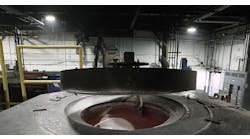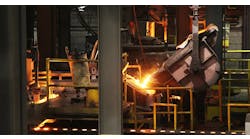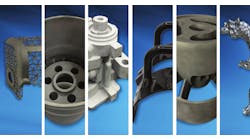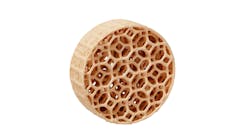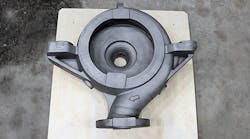The Castings Group of Britain’s Advanced Manufacturing Research Centre (AMRC) reported it produced a 200-kg titanium casting from a ceramic-shell mold, the largest such product ever manufactured in Europe from a single pour, the R&D foundry noted. The casting was produced as part of an industrial centrifugal pump, for processing highly corrosive materials used in chemical and petrochemical handling.
Ceramic shell molding is a process that uses reusable patterns that are coated with a slurry mixture, then fired in an oven or kiln to harden the shape. When the pattern is removed the ceramic shell remains, to be used for filling with molten metal.
The University of Sheffield’s Advanced Manufacturing Research Centre works to develop and promote advanced manufacturing technologies for aerospace, automotive, medical, and other manufacturing sectors. It installed the titanium foundry operation last year as part of an effort to raise U.K. companies’ expertise for supplying large-scale titanium aerospace engine and structural programs.
The 200-kg cast-titanium centrifugal pump housing was produced from a 680-kg melt, as a test piece and will be featured as proof of AMRC’s titanium casting capabilities.
“This test piece is a significant step forward for us and the U.K. as a whole,” observed AMRC Castings’ General Manager, Richard Cook. “We are the U.K.’s only titanium melting facility and this achievement, sends a clear signal that the country is open for business for large-scale titanium casting.
The next step will be to pour more than 1,000 kg of titanium for a 500-kg centrispun casting, a goal the AMRC has set to complete by May 2018. It’s said this task will test the capabilities of the Retech consumable-electrode furnace installed there last year.
The furnace has three interchangeable crucibles capable of melting titanium for castings weighing up to 500 kg, and 2,000 mm in diameter by 2,500 mm long.
The group is already dealing with enquiries from companies wanting to exploit the technology and are currently conducting paper studies and piloting the first research projects.
“The AMRC are currently engaged in several projects looking to improve capability and technology to enable more complex, higher-integrity components to be designed for manufacture with improved metallurgical quality and increased dimensional accuracy,” according to principal metallurgist Matt Cawood.
“Having the ability to pour large-scale castings as part of a research and development activity, combined with the surrounding facility of industry-scale equipment and technical expertise, is a unique offering that is drawing in many of the world’s largest users of titanium castings to work with us,” Cawood added.
